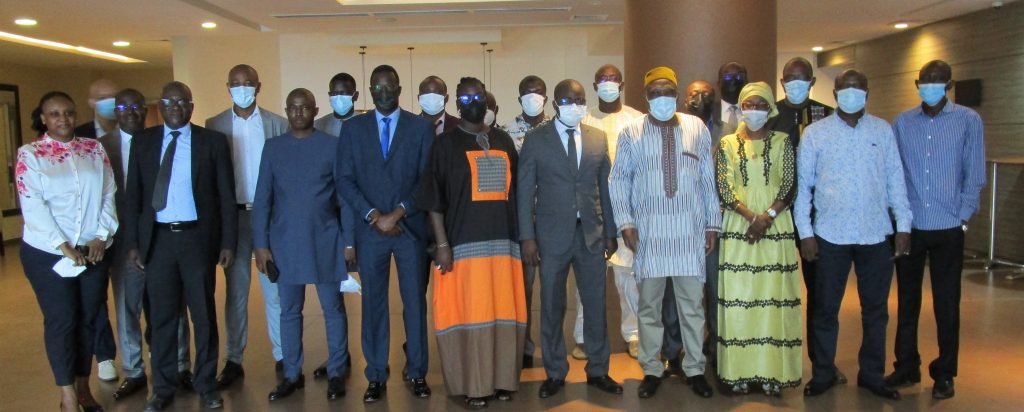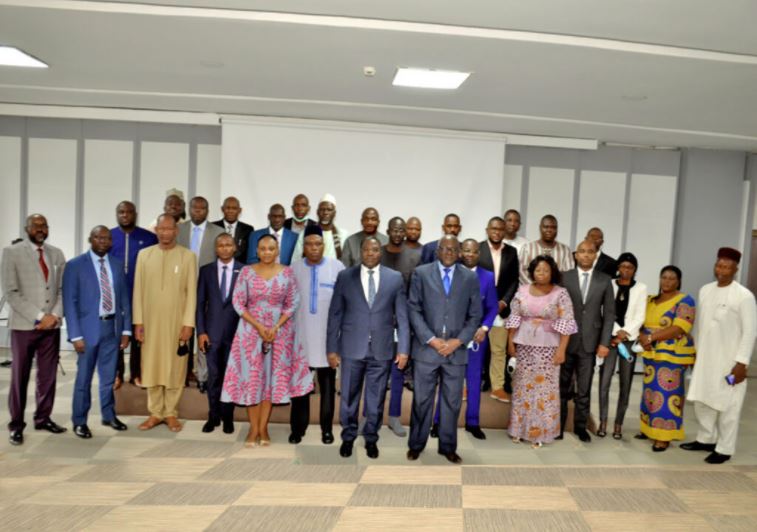
TRAIN-THE-TRAINERS WORKSHOP ON THE ECOWAS PREFERENTIAL TREATMENT MECHANISM (ELTS), Abidjan , 14 – 18 MARCH 2022.
The Economic Community of West African States (ECOWAS) aims to promote cooperation and integration leading to the creation of an Economic and Monetary Union for the promotion of economic growth and development in West Africa.
To achieve this objective, the ECOWAS Revised Treaty provides in its Article 3 for the establishment of a common market through
- the liberalization of trade through the elimination of import and export customs duties on goods between member states and the elimination of non-tariff barriers to the creation of a free trade zone in the subregion
- establishment of a common external tariff and a common trade policy vis-à-vis third countries
- Removal, among member states, of obstacles to the free movement of persons, goods, services and capital and to the right of residence and establishment.
The implementation of the ECOWAS Trade Liberalization Scheme (ETLS) in the 1990s thus provided the community framework for the operationalization of the ECOWAS Free Trade Area.
With the evolution of origin recognition procedures in the world and the need to ensure that the FTA becomes a real vector of industrial and economic growth in West Africa, ECOWAS has revised all the texts relating to origin.
An Additional Act on ECOWAS rules of origin and procedures for recognition of origin was adopted in December 2018. Two regulations on the modalities of implementation of the Additional Act were adopted in December 2021 by the Council of Ministers.
The main objective of these reforms was to update and simplify the procedures for recognizing and certifying community origin while respecting member states’ commitments with other international organizations such as the World Customs Organization (WCO) and the World Trade Organization (WTO).
The main objective of these training workshops is to train the focal points of the National Committee for the Recognition of Origin (NCOR ) on the new ECOWAS rules of origin.
The specific objectives of these training workshops are to equip :
- the NCOR focal points to understand the new ECOWAS rules of origin and the procedure for recognition of origin during the working sessions.
- Focal points to identify a product as originating in accordance with the ECOWAS rules of origin during the working session on recognition of origin and during customs clearance at the border.
- Customs administrations to grant approved exporter status to an economic exporter who requests it.
- Customs focal points to authenticate an ECOWAS certificate of origin during customs clearance.
- Focal points train and sensitize other stakeholders on ECOWAS preferential tariff treatment.
The training workshops will focus on the new provisions introduced in the Supplementary Act and Regulations:
- the article on wholly obtained products has been amended to remove the 60% local content criterion, in order to ensure strict compliance with the definition of the concept: “products are considered “wholly obtained” when they are wholly produced in a contracting party without the use of inputs from other countries”.
- a new method of calculating value added based on the maximum threshold of the value of non-originating materials
- a new introduction on “neutral elements”.
- the validity of the proof of origin is extended to 12 months instead of the 6 months initially foreseen.
- electronic certificate of origin: this format has been introduced to reduce fraud and facilitate the circulation of originating products in the region, by reducing the time spent at the borders
- Invoice declaration as proof of origin for approved exporters, under certain conditions, is a measure to simplify the certification of origin process.
- the approved exporter is a new introduction linked to the issuance of the invoice declaration.
The participants were from customs administrations and other NCOR structures. Each member state will be represented by two (2) delegates members of the NCOR from francophone Member states.
The opening ceremony was marked by two interventions, that of the representative of the ECOWAS Commission and the opening speech delivered by the representative of the Ministry in charge of Integration of Côte d’Ivoire.
Taking the floor, the representative of the Commission, Mr. Salifou Tiemtoré, Director of the Customs Union and Taxation, first thanked the experts for their availability and for their interest in the main community instrument for trade in goods. This workshop is an exchange on these revised texts not only for a harmonized understanding but also for an alignment to the international contexts to avoid differences and difficulties in the implementation.
During his opening speech, Mr. PHILIPPE GOLI, Director of Community Policies, Trade and Free Movement welcomed the participants, and delivered the speech of the Minister Delegate in charge of African Integration, who was unable to attend. He emphasized that since its implementation, the ETLS has made it possible to promote community trade.
He appreciated the proactive action taken by the Commission to deepen this regional economic integration, by simplifying the procedures for the recognition and certification of Community origin, which has led to the adoption of revised texts that meet the new challenges. he stressed
Mr GOLI reiterated that organizing such a workshop for these experts in charge of the preferential treatment of ECOWAS was important in harmonizing the points of view as it relates to the implementation of these texts. He finally urged the participants to give the desired attention to draw better benefits and to wish the participants full success. He then declared the workshop open.
The dynamic nature of the training allowed the members of the National Committee for the Recognition of Community Origin (NCOR ) to share their experiences in terms of recognition of community origin. Indeed, these exchanges focused on the implementation of reforms relating to the processing time of applications for recognition of community origin, the site visit, and the role of customs in the Committee. At the end of the training, participants noted an inconsistency in the final provisions in Article 26 of the Supplementary Act laying down the ECOWAS rules of origin. They proposed that this article be framed by a transition period of two (02) years for an update of the old approvals obtained under Protocol A/P1/1/03 to the new criteria of the Additional Act A/SA.7/12/18.
At the end of the training, the NCOR members in turn thanked the ECOWAS Commission, in particular the Directorate of Customs and Taxation and their implementing partners GIZ within the framework of the West Africa Trade Facilitation Program for their support to the effective and efficient implementation of the ECOWAS Preferential tariff treatment (ETLS).
They assured the Commission that the training received will be transferred to other NCOR members at the national level.
The training took the form of a training of trainers since these focal points will in turn train the various actors in their respective countries.
At the end of the training, Salifou TIEMTORE, on behalf of the Commissioner of Trade, Customs and Free Movement, thanked the participants for their attendance and especially for the quality of discussions during the training. He reiterated the commitment of the ECOWAS Commission to support the implementation of the roadmap of Member States.



